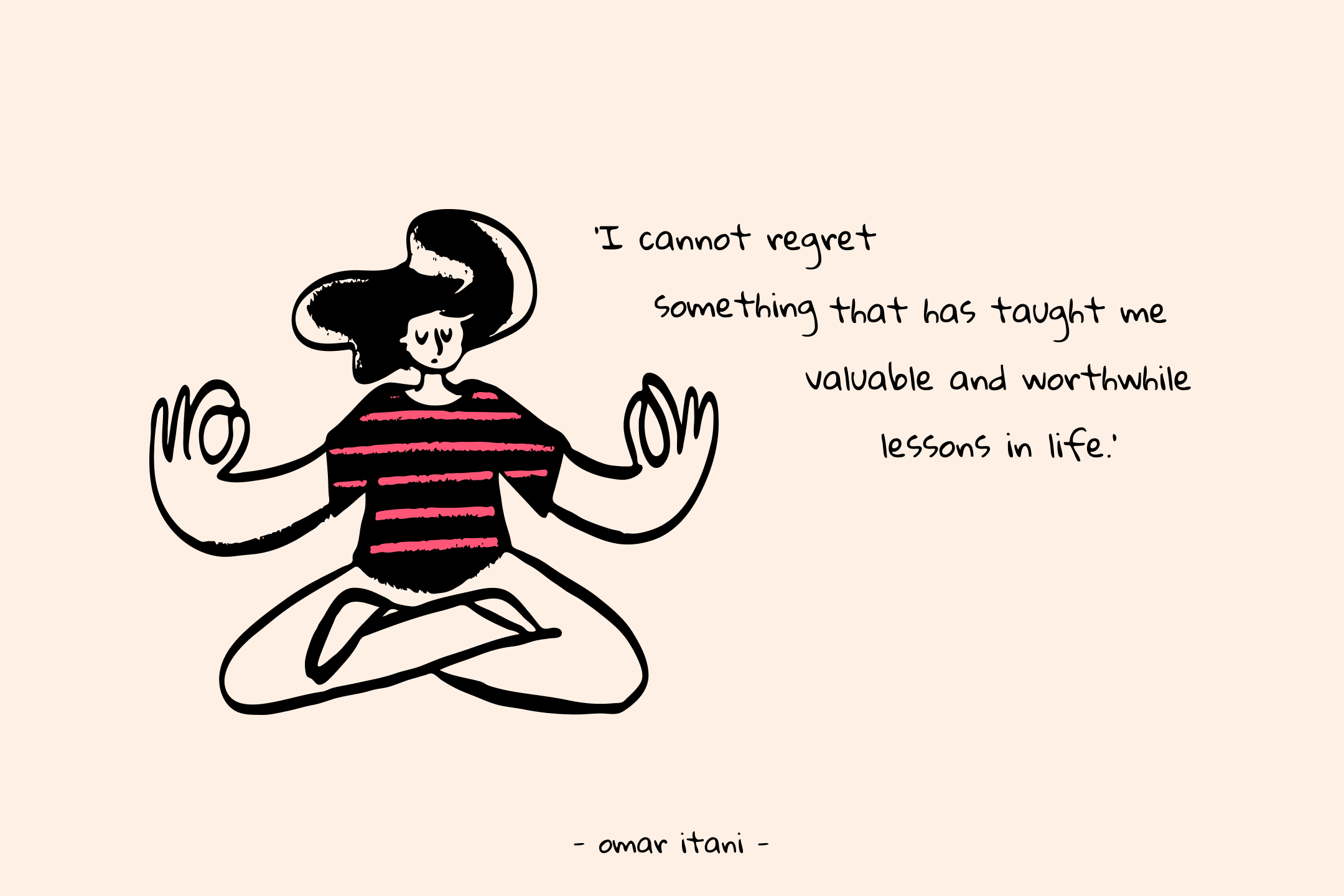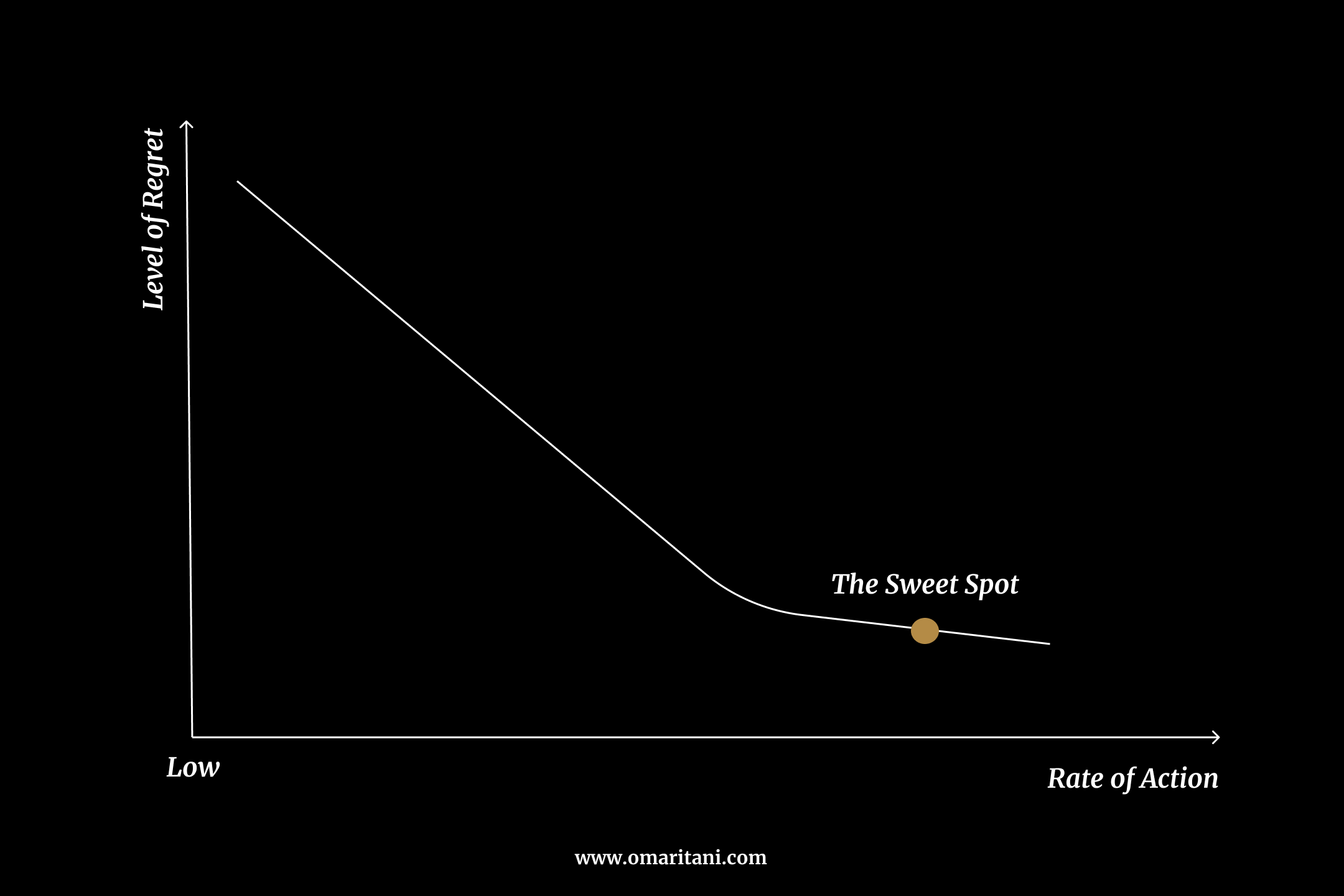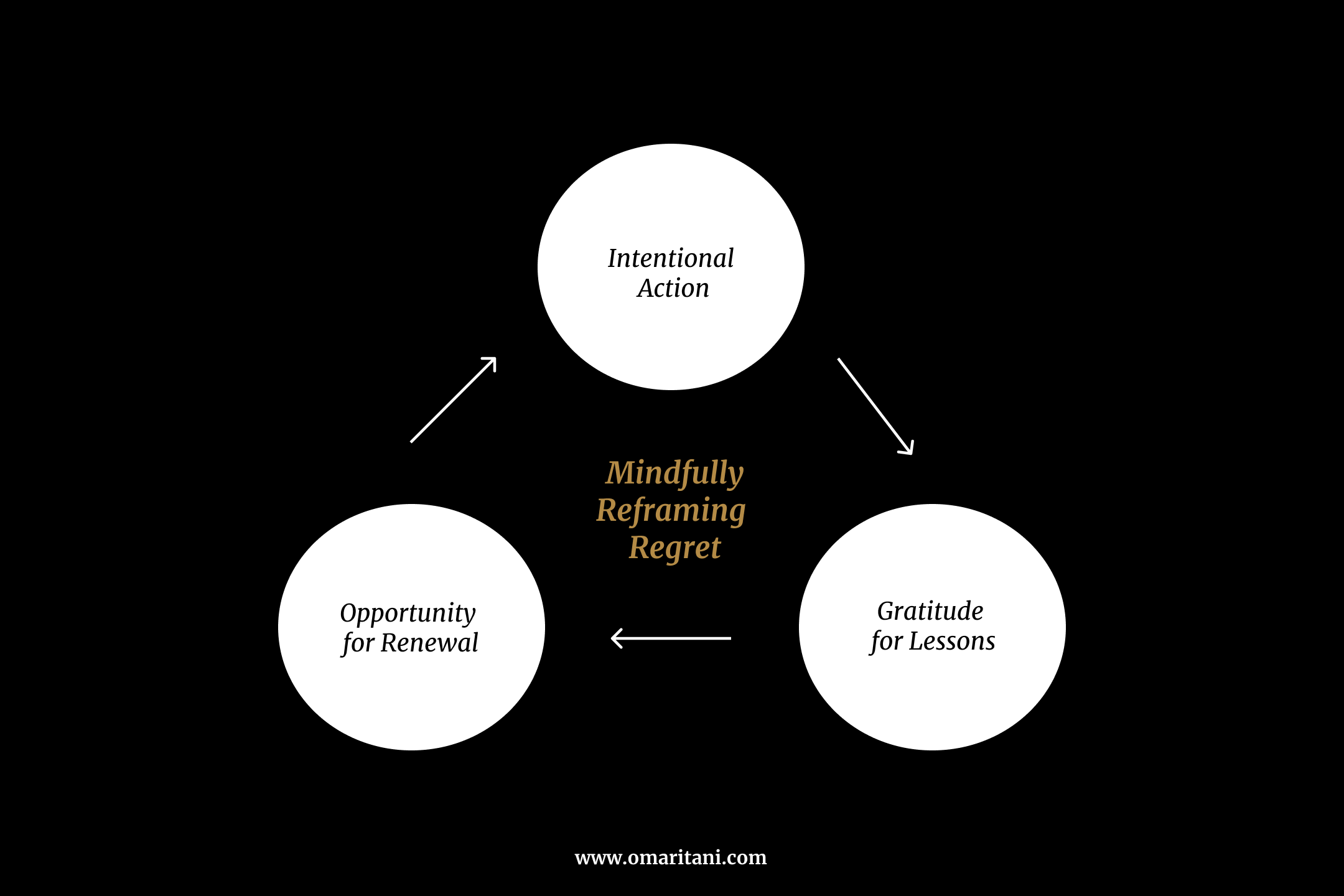How to Mindfully Deal With Regret: Never Regret Something That Has Taught You Valuable Lessons in Life
The other day I was having coffee and catching up with a friend I hadn’t seen in over a year when he asked me this question: “Do you regret leaving Google?”
I had made the decision to quit my job two years ago, and I did it because I was fed up with the corporate world and was eager to try something new and pave my own path within the entrepreneurial realm instead. I had no idea what was ahead—whether I would soar upward or crash downward—but I was beyond ready to waltz my way right into this space of uncertainty.
“Of course, I don’t regret it. I was really unhappy there,” I answered. But when I paused for a moment to reflect more deeply on his question, I arrived at this realization: We cannot regret something that has taught us valuable and worthwhile lessons in life.
Truth is, not every decision we make will be the right choice for us. I learned later that quitting my one and only source of income to start an e-commerce business from scratch was a recipe for financial disaster. No, that decision was not the right one at the time. Perhaps I should’ve followed the advice I preach today: Build your business while working a full-time job so that you can work from a place of stability. But then again, I wouldn’t have learned such a valuable lesson (among many others) had I not acted upon what was truly important to me at the time—the freedom of paving my own path, on my own terms.
When it comes to regret, we don’t have a healthy relationship with it because we usually look at it through the wrong lens. Most of the time, when we look back in reflection, we regret the choices we made after we consider ‘what could’ve been’ had we taken a different path.
What if I had taken up that job offer instead of rejecting it?
What if we didn’t break up?
What if I tried to start that online business idea instead of just talking about it?
We regret what’s in the past and can’t be changed, and what’s worse is that we dwell in it. We compare the choices we made yesterday to an ideal path that we think we should have taken, even though we have no concrete measure of where that path could have led us—we simply imagine it to be a better path. So we start to think these absurd thoughts: “If only I did that, this would’ve happened.”
And that’s the most harmful lens through which one should tinker with regret. It anchors your mind in the past and floods your mental space with the emotional strain of remorse. It rips away your power to toil in the language of action and you lose your grip on what matters most: What you do with your time, today.
There’s a much better way to look at regret—a more mindful way—and it manifests at the intersection of action, reflection, and gratitude.
A Life of Regret is Born Out of Inaction
Bronnie Ware, the author of The Top Five Regrets of the Dying, is an Australian nurse who spent over a decade caring for patients nearing the end of their time on earth. When she’d questioned her patients about any regrets they had or anything they would have done differently, she noted five common themes that surfaced again and again:
I wish I hadn’t worked so much.
I wish I’d had the courage to express my feelings.
I wish I had stayed in touch with my friends.
I wish that I had let myself be happier.
And the most common regret was this:
I wish I’d had the courage to live a life true to myself, not the life others expected of me.
In another research, Gilovich & Medvec also revealed that “when people look back on their lives, it is the things they have not done that generate the greatest regret… People’s actions may be troublesome initially; it is their inactions that plague them most with long-term feelings of regret.”
The message is clear: We tend to regret the actions we didn’t take more so than the ones we did. We will regret the book we didn’t try to write, the offer we didn’t have the courage to take, that side business idea we never pursued, and the podcast we only talked about starting, but never did.
The regret that stems from inaction is far greater than that of action. That’s why, in my case, while I made several mistakes along my journey, I still look back at my decision and confidently say, I don’t regret what I did. Yes, given the many lessons I’ve since learned, I would approach it differently now if I were to re-do it, but that’s the beauty of life: you try, you learn from your mistakes, you grow.
To Have Some Regrets is Healthy, to Live a Life Filled With Regrets is Not
The idea, however, is not to live a life that is regret-free, because quite honestly, that’s an absolute way of living, and thus, it’s rendered impossible by default. Edith Piaf’s famous song of "Non, je ne regrette rien" (No, I don’t regret anything) was just that—a song. Of course, there are things we already regret today and things that we might regret further into the future.
To have some regrets is normal and healthy. In fact, a small dose of regret is considered a positive “negative emotion.” It helps you make sense of the world, gain insight into what matters to you, and avoid future negative behaviors. But as explained by psychologist Melanie Greenberg, “regret can have damaging effects on mind and body when it turns into fruitless rumination and self-blame that keeps people from re-engaging with life. This pattern of repetitive, negative, self-focused ruminative thinking is characteristic of depression.”
The ultimate goal for each and every one of us is to live a well-lived life, one that is not riddled with lament and regret. And as mentioned above, inaction is the greatest regret of all. Hence, your objective is to double your rate of action so you can slash your level of regret.
We cannot live a regret-free life, but we can live a life that is not riddled by regret. The secret to that life is to take action against the things that matter to us. It’s to live fully and authentically, to try things and make mistakes so we can learn, evolve, and grow. Hence, your objective is to double your rate of action so you can slash your level of regret.
Reframing Regret: What Your Regrets Are Trying to Tell You
So the question is: What do you regret?
What are the things that you keep ruminating on? What’s a broken record that keeps orchestrating mayhem in your mind? What’s haunting you and pulling you deeper into the playground of self-sabotage?
Everything that just conjured up images in your mind is holding you back from becoming who you want to be. But it’s not the regrets that are weighing you down—it’s what you’re perceiving them to be.
Similar to failures, which are nothing more than lessons learned on how not to do things, flip the equation and regrets become nothing more than lessons learned on what matters to us. More so, they transform into signs for change, signaling to us where our greatest opportunities for growth and renewal are. As researcher Neal Roese writes in one of his studies on regret:
“People’s biggest regrets are a reflection of where in life they see their largest opportunities; that is, where they see tangible prospects for change, growth, and renewal.”
Maybe the regret you have for the one friendship that fizzled down is a sign that you wish to renew it. All that’s left for you is to take action toward it. Maybe the regret you have for the book you stopped working on is what your heart is urging you to lean back into. All that’s left for you is to pick up where you once left off. Maybe the regret you have for the job you quit is a reflection of where in life you see your largest opportunity at the moment—to go back and get it.
We can all learn and grow from our regrets.
But we can only do so once we begin leaning into them, rather than shying away from them. When we learn to be grateful for them, rather than resentful of them—when we reflect upon their lessons, rather than run away from them—that’s when we start to see the opportunities for renewal.
Truth us, without regret, you are done evolving. Why? Because that means you’re shying away from taking calculated risks, expanding your horizons, and trying new things, and making mistakes in the process of doing so. Without regret, you’re not evolving because you’re not learning and thus, you’re rendering yourself ineffective at coping with uncertainty and unpredictability.
And that’s the pivot point upon which we can mindfully reframe regret.
A More Mindful Perspective on How to Deal with, and Avoid Regret:
Take intentional action on the things that matter to you. Don’t just do things for the sake of doing them. Don’t just jump on the trendy train because it’s cool. So often, we rush into what we think we want, without evaluating whether it truly matters to us. That’s why the first step is to take intentional action instead of aimless action or inaction. Intentional action is aligned with your ideal goals and objectives in life—know exactly what you want and where you want to go, and then take the first step toward it. In the words of Michel de Montaigne: “A skillful archer ought first to know the mark he aims at, and then apply his hand, his bow, his string, his arrow, and his motion accordingly… No wind works for the man that has no intended post to sail towards.”
Reflect upon your mistakes, failures, and wins, and instead of rejecting them, accept them, and then seek the valuable lessons that they have taught you and be grateful for them. Ask yourself: “What lessons have I learned from this experience? How have I grown from it, and can continue to evolve through it?” Here’s an interesting journaling prompt you can use: “Imagine that you are talking to yourself about this regret from a compassionate and understanding perspective. What would you say?”
Identify where the signs for change and growth and the opportunities for renewal lie. For me, when I look back on my decisions and actions over the past two years, I’ve learned so much. Leaving Google and starting my own business led me to the realization that I have a lot more to learn about myself and the world of business. It revealed to me what I want to do with my life and my time on earth. It launched me onto a journey of personal growth and self-development. It helped me build better habits. It led me onto the path of creative writing. I followed the signs, I saw the opportunities, I opened the doors that revealed themselves to me, and I walked through them. How can I not be grateful for this?
A More Mindful Perspective on Regret.
It’s More Important to Live Fully and Make Mistakes Than it is to Live in a Straight Line
If we go back to that biggest regret of all, “I wish I’d had the courage to live a life true to myself, not the life others expected of me,” one thing becomes crystal clear: It’s better to live a life that’s authentically yours, a life that’s true to you, where you live fully and make mistakes, rather than live a life that follows a straight line, a line that was drawn for you by someone else. When you look back in twenty years, you’ll think, “I’m glad I did” instead of “I wish I had.” These four words are the difference between a life well-lived and a life filled with regret.
The way to do so is to follow four simple rules:
1. Always take calculated risks and never be afraid to try.
“It’s not the leap that’s dangerous, it’s the landing.”
—Peter Barton, Not Fade Away
What scares us isn’t the leap—of quitting the job, investing in a business, breaking up with our partner; what scares us is the landing that will inevitably follow—being unemployed, failing in our venture, feeling lonely. Why? Because while the leap is a momentary decision, the landing forms the stretch of consequences we must bear.
And yet, for most decisions, we spend the majority of our time and energy contemplating the leap, barely allowing any deep thought to delve into the landing process. So here’s an idea: Why not solve the landing problem first, and then work backward to the leap? With such an approach, you calculate your risk, strap on your parachute, and tiptoe your way to the edge of the cliff instead of just jumping off blindingly into the unknown.
2. Make authentic choices every day.
“Authenticity is a collection of choices that we have to make every day. It’s about the choice to show up and be real. The choice to be honest. The choice to let our true selves be seen.”
— Brené Brown, The Gifts of Imperfection
The only way to live a life that’s true to you is to have the courage and discipline to show up to it every day. Make authentic choices that you expect of yourself because if you live for someone else’s expectations of you, you’ll never find genuine happiness or a sense of fulfillment.
3. Believe that everything will make sense later on.
“You can't connect the dots looking forward; you can only connect them looking backwards. So you have to trust that the dots will somehow connect in your future. You have to trust in something—your gut, destiny, life, karma, whatever. This approach has never let me down, and it has made all the difference in my life.”
— Steve Jobs
As you walk the path toward what you want, you must find confidence in your wobble. The path is not straight, and neither is it smooth, but you must keep walking with the belief that you will figure it out. You must remind yourself that you’ve already scaled mountains you never thought you could. You must believe that it’s only a matter of time before you will find yourself looking back and thinking “it all makes sense now.”
4. Be grateful for whatever happens.
You’re taking intentional action against what you want, you’re doing your best to live as authentically as you can within the boundaries of society, and you’re consciously reminding yourself to have faith that you’re walking the right path. All that’s left is to be grateful for the lessons you will learn, the mistakes that will teach you those lessons, and for the inevitable growth and positive outcomes you will experience along the way.
Isn’t that a recipe for a life well-lived?
What Matters to You: All Life is an Experiment
Life is made up of a series of moments brought together. And at each and every moment, and whether intentionally or not, you’re making decisions: What to eat for lunch, which group of friends to hang out with over the weekend, how to invest your money, what goals to pursue next in life.
Even if, looking back at it now, you think you’ve made the wrong choice, or you realize you’ve made lots of mistakes along the way, you cannot regret the choices you made, because they’ve taught you valuable lessons and have gone on to define who you’ve become.
You cannot regret building our own business and investing a portion of your savings in it because that event revealed to you the true depth of your inner strength and resilience. You cannot regret breaking-up from an unhealthy relationship when it led you to realize how void of self-love you once were.
The way I see it, you must never regret something that has taught you valuable lessons in life. So whenever you find yourself ruminating in regret, stop and ask yourself these two questions: “What have I learned from this? And how have I grown better because of it?” Perhaps you might just shift your perspective from that of being resentful and regretful to being appreciative and grateful.
And for whatever choices you’re contemplating next, consider the words of Ralph Waldo Emerson: “Don’t be too timid and squeamish about your actions. All life is an experiment.” And as with any experiment, you’ll never accomplish anything in life if you’re too afraid to look bad trying. So go ahead—live fully, try, and make mistakes. There will be nothing for you to regret once you realize that everything you do will teach you incredibly valuable and worthwhile lessons in life—lessons that will allow you to learn, evolve, and grow.


